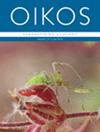了解多倍体的建立:暂时持续还是稳定共存?
IF 3
2区 环境科学与生态学
Q2 ECOLOGY
引用次数: 0
摘要
由全基因组复制(WGD)产生的多倍体在自然界无处不在,据说与极端环境和生物入侵有关。然而,WGD 通常要付出巨大的代价,这就对新形成的多倍体的建立机会提出了质疑。在自然界中观察到的多倍体和混合倍性物种数量之多令人惊讶,这可能是它们不断出现的结果,也可能反映了稳定的多倍体持续存在,甚至在某些情况下与祖先的倍性共存。然而,有关当代多倍体建立的实证研究往往忽视了多倍体特征的成本效益平衡、表型特征之间的权衡、细胞型间的相互作用、多倍体的反复形成以及随机过程。在此,我们主张综合考虑上述影响多倍体建立及其与祖先长期共存的因素,考虑种群层面的成功。我们从现代共存理论的角度探讨了高成本下多倍体建立的悖论,并概述了有可能实现稳定而非短暂共存的各种机制及其时机。本文章由计算机程序翻译,如有差异,请以英文原文为准。
Understanding polyploid establishment: temporary persistence or stable coexistence?
Polyploidy, resulting from whole-genome duplication (WGD), is ubiquitous in nature and reportedly associated with extreme environments and biological invasions. However, WGD usually comes with great costs, raising questions about the establishment chance of newly formed polyploids. The surprisingly high number of polyploid and mixed-ploidy species observed in nature may be a consequence of their continuous emergence or may reflect stable polyploid persistence and even coexistence with the ancestral ploidy under certain circumstances. However, empirical studies on contemporary polyploid establishment often neglect the cost–benefit balances of polyploid characteristics, tradeoffs between phenotypic characteristics, intercytotype interactions, recurrent polyploid formation, and stochastic processes. Here, we advocate for considering population-level success, combining the aforementioned factors that affect polyploid establishment and long-term coexistence with their ancestors. We approach the paradox of polyploid establishment despite high costs from a modern coexistence theory perspective and give an overview of the diversity of mechanisms and their timing that may potentially enable stable rather than transient persistence.
求助全文
通过发布文献求助,成功后即可免费获取论文全文。
去求助
来源期刊

Oikos
环境科学-生态学
CiteScore
6.20
自引率
5.90%
发文量
152
审稿时长
6-12 weeks
期刊介绍:
Oikos publishes original and innovative research on all aspects of ecology, defined as organism-environment interactions at various spatiotemporal scales, so including macroecology and evolutionary ecology. Emphasis is on theoretical and empirical work aimed at generalization and synthesis across taxa, systems and ecological disciplines. Papers can contribute to new developments in ecology by reporting novel theory or critical empirical results, and "synthesis" can include developing new theory, tests of general hypotheses, or bringing together established or emerging areas of ecology. Confirming or extending the established literature, by for example showing results that are novel for a new taxon, or purely applied research, is given low priority.
 求助内容:
求助内容: 应助结果提醒方式:
应助结果提醒方式:


